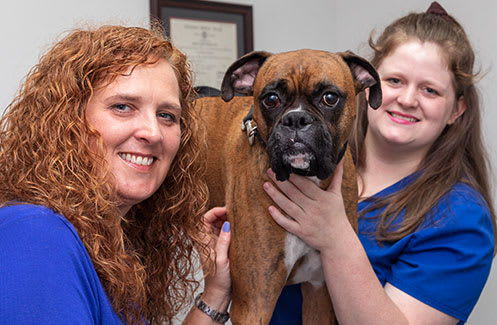The veterinarians at our Bartlett animal hospital can help care for and manage dermatological (skin) and allergy issues your pet may experience.
What do dermatology services cover?
Dermatological services help treat and prevent diseases of the skin, coat, ears and nails, that can develop from a range of sources, including allergic responses.
As veterinary professionals, we know that chronic recurrent skin problems, ear infections and allergies can be extremely irritating to your pet, and frustrating for you as a pet owner.
With a range of tests available to us in-house, we look for the root cause of your pet’s skin disorder and offer a customized treatment plan to start the healing process.

Our Dermatological Services
Hillcrest Animal Hospital offers the following dermatological services:
- Allergy testing, diagnoses & treatment
- Treatment of mites (demodex & scabies)
- Treatment of ear & nose disorders
- Laser treatment for skin disorders
- Diagnosis & treatment of hair loss & hormonal disease
- Diagnosis & treatment of paw & nail disorders
- Identification of underlying cause of seborrheic & breed disorders
- Identification & treatment of immune disorders
- Diagnosis & treatment of skin cancer & tumors
FAQs About Skin Problems & Allergies
ASK A DIFFERENT QUESTION
- What are common skin conditions in dogs and cats?
There are many different skin conditions that can affect dogs and cats, but some are more common than others. These include itching, skin irritation, allergies, hot spots, hair loss, flea bites and dry skin. Skin problems in pets can range from mild, temporary issues to more serious problems that can lead to skin infections and other health issues.
- What causes skin problems in dogs and cats?
Pets can develop skin problems as a result of allergic reactions to substances in their environment, such as chemicals in cleaning products. Others can have skin problems due to a reaction to ingredients in their food, an underlying disease or condition, or fleas.
- What are some ways to help prevent pet skin problems?
Preventive measures depend on the specific cause of your pet's skin problem. Once the problem has been diagnosed and treated, the vet will provide advice for how to to prevent the problem from recurring. Things that may help include changes in the pet's diet or your household products, flea treatment, hypoallergenic soaps and grooming products, brushing to prevent matting, or a quieter, less stressful environment for the pet.
- When should I bring my pet to the vet for a skin problem?
You should make a dermatological appointment with the vet if your pet has scratched or bitten themselves to the point that sores or bleeding has occurred, if they are losing fur at an alarming rate, or if they have a strange bump or lump on the skin.
- What if my pet is scratching, but shows no visible signs of skin problems?
If you pet is scratching or grooming excessively, but you do not see any visible indicators that there is a skin problem, you should still bring your pet to the vet. Excessive scratching and grooming could be a sign of a number of underlying issues, and can cause skin problems to develop if left unaddressed.
